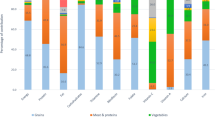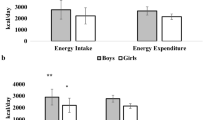Abstract
Objectives
There is a lack of detailed information on dietary intake in elderly people at an individual level, which is crucial for improvement of nutritional support. The aim of this study was to investigate the dietary intake in elderly people in two types of living situations.
Design
Observational study, analysing prospective data.
Setting
The dietary intake was studied in elderly people living at home or in nursing home, in different cities of Sweden.
Participants
A total of 264 elderly people (mean age 84) participated in the observational study.
Measurements
Dietary intake was measured using weighed food records and food diaries, comparing females and males. The observed dietary intake was related to Recommended intake and Lower intake level.
Results
All dietary intake and patient characteristic variables showed large individual differences (ranges). We found no significant differences (p>0.05) between those living at home and nursing home residents regarding the average intake of energy, protein and water when expressed as total intake per kg of body weight. A very low daily intake of energy (<20 kcal/kg body weight/day) was observed in 16% of the participants. For vitamin D and iron, 19% and 15%, respectively, had intakes below the Lower intake level. There was no correlation between intake of energy, protein or water and resident characteristics such as age, autonomy, morbidity, nutritional state or cognition.
Conclusions
The large individual differences (ranges) in energy, nutrients and water show that the use of mean values when analysing dietary intake data from elderly people is misleading. From a clinical perspective it is more important to consider the individual intake of energy, nutrients and water. Ageism is intrinsic in the realm of ‘averageology’.
Similar content being viewed by others
References
Christensen K, Doblhammer G, Rau R, Vaupel JW. Ageing populations: the challenges ahead. Lancet 2009;374(9696):1196–1208.
Lennartsson C, Heimerson I. Elderly people’s health: Health in Sweden: The National Public Health Report 2012. Chapter 5. Scand J Public Health 2012;40(9 Suppl):95.
Szebehely M, Trydegard GB. Home care for older people in Sweden: a universal model in transition. Health Soc Care Community 2012;20(3):300–309.
Lammes E, Akner G. Repeated assessment of energy and nutrient intake in 52 nursing home residents. J Nutr Health Aging 2006;10(3):222–230.
Akner G, Flöistrup H. Individual assessment of intake of energy, nutrients and water in 54 elderly multidiseased nursing-home residents. J Nutr Health Aging 2003;7(1):1–12.
Andersson J, Gustafsson K, Fjellstrom C, Sidenvall B, Nydahl M. Five-day food intake in elderly female outpatients with Parkinson’s disease, rheumatoid arthritis or stroke. J Nutr Health Aging 2004;8(5):414–421.
Leslie WS, Lean ME, Woodward M, Wallace FA, Hankey CR. Unidentified under-nutrition: dietary intake and anthropometric indices in a residential care home population. J Hum Nutr Diet 2006;19(5):343–347.
Iuliano S, Olden A, Woods J. Meeting the nutritional needs of elderly residents in aged-care: Are we doing enough? J Nutr Health Aging 2013;17(4).
Morley JE. Anorexia of aging: physiologic and pathologic. Am J Clin Nutr 1997; 66(4):760–773.
Nydahl M, Andersson J, Sidenvall B, Gustafsson K, Fjellstrom C. Food and nutrient intake in a group of self-managing elderly Swedish women. J Nutr Health Aging 2003;7(2):67–74.
Nowson C, Sherwin A, McPhee J, Wark J, Flicker L. Energy, protein, calcium, vitamin D and fibre intakes from meals in residential care establishments in Australia. Asia Pac J Clin Nutr 2003;2(2):172–177.
de Boer A, Ter Horst GJ, Lorist MM. Physiological and psychosocial age-related changes associated with reduced food intake in older persons. Ageing Res Rev 2013;12(1):316–328.
Nordic Council of Ministers. Nordic Nutrition Recommendations 2004. Integrating nutrition and physical activity. 4th edition ed. Copenhagen: Nordic Council of Ministers.
Katz S, Ford AB, Moskowitz RW, Jackson BA, Jaffe MW. Studies of illness in the aged. the index of ADL: a standardized measure of biological and psychosocial function. JAMA 1963;185:914–919.
Worrall G, Chaulk P, Briffett E. Predicting outcomes of community-based continuing care. Four-year prospective study of functional assessment versus clinical judgment. Can Fam Physician 1996;42:2360–2367.
Folstein MF, Folstein SE, McHugh PR. «Mini-mental state». A practical method for grading the cognitive state of patients for the clinician. J Psychiatr Res 1975;12(3):189–198.
Lammes E, Törner A, Akner G. Nutrient density and variation in nutrient intake with changing energy intake in multimorbid nursing home residents. J Hum Nutr Diet 2009;22(3):210–218.
Guigoz Y, Vellas B, Garry PJ. Assessing the nutritional status of the elderly: The Mini Nutritional Assessment as part of the geriatric evaluation. Nutr Rev 1996;54(1 Pt 2):S59–65.
Gibson RS. Principles of Nutritional Assessment. 1st ed. New York: Oxford University Preee, Inc, 1990.
Gariballa SE, Forster SJ. Dietary intake of older patients in hospital and at home: the validity of patient kept food diaries. J Nutr Health Aging 2008;12(2):102–106.
Lammes E, Rydwik E, Akner G. Effects of nutritional intervention and physical training on energy intake, resting metabolic rate and body composition in frail elderly. a randomised, controlled pilot study. J Nutr Health Aging 2012;16(2):162–167.
Millward DJ. Metabolic demands for amino acids and the human dietary requirement: Millward and Rivers revisited. J Nutr 1988;128(12 Suppl):2563S–2576S.
Chidester JC, Spangler AA. Fluid intake in the institutionalized elderly. J Am Diet Assoc 1997;97(1):23–8.
Ödlund Olin A, Armyr I, Soop M, Classon I, Cederholm T, Ljungren G. Energy-dense meals improve energy intake in elderly residents in a nursing home. Clin Nutr 2003;22(2):125–131.
Engelheart S, Lammes E, Akner G. Elderly peoples’ meals. A comparative study between elderly living in a nursing home and frail, self-managing elderly. J Nutr Health Aging 2006;10(2):96–102.
Zhu K, Devine A, Suleska A, Tan CY, Toh CZ, Kerr D. Adequacy and change in nutrient and food intakes with aging in a seven-year cohort study in elderly women. J Nutr Health Aging 2010;14(9):723–729.
Author information
Authors and Affiliations
Corresponding author
Rights and permissions
About this article
Cite this article
Engelheart, S., Akner, G. Dietary intake of energy, nutrients and water in elderly people living at home or in nursing home. J Nutr Health Aging 19, 265–272 (2015). https://doi.org/10.1007/s12603-015-0440-0
Received:
Accepted:
Published:
Issue Date:
DOI: https://doi.org/10.1007/s12603-015-0440-0




